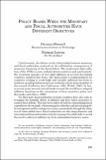| dc.contributor.author | Bennett C., Herman | |
| dc.contributor.author | Loayza O., Norman | |
| dc.date.accessioned | 2019-11-01T00:01:36Z | |
| dc.date.available | 2019-11-01T00:01:36Z | |
| dc.date.issued | 2002 | |
| dc.identifier.isbn | 956-7421-099 | |
| dc.identifier.uri | https://hdl.handle.net/20.500.12580/3659 | |
| dc.description | Until recently, the debate on the relationship between monetary and fiscal authorities centered on the inflationary consequences of mentary financing of the fiscal deficit. The moderately high inflation of the 1970s in some industrialized countries and, particularly, the recurring episodes of very high inflation in several developing countries seeking to avoid high and variable inflation has been to institute an independent monetary authority whose main mandate is the control of inflation. | |
| dc.format | .pdf | |
| dc.format.extent | Sección o Parte de un Documento | |
| dc.format.medium | p. 299-330 | |
| dc.language.iso | eng | |
| dc.publisher | Banco Central de Chile | |
| dc.relation.ispartof | Serieson Central Banking, Analysis, and Economic Policies, no. 4 | |
| dc.rights | Attribution-NonCommercial-NoDerivs 3.0 Chile | * |
| dc.rights.uri | http://creativecommons.org/licenses/by-nc-nd/3.0/cl/ | * |
| dc.subject | POLÍTICA MONETARIA | es_ES |
| dc.subject | POLÍTICA FISCAL | es_ES |
| dc.subject | INFLACIÓN | es_ES |
| dc.title | Policy biases when the monetary and fiscal authorities have different objectives | |
| dc.type.doc | Artículo | |
| dc.file.name | BCCh-sbc-v04-p299_330 | |


